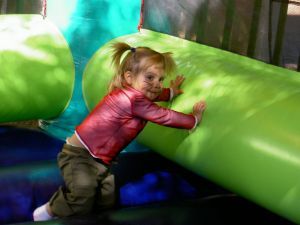Motivation
Praising Kids for Unimpressive Accomplishments
Overvaluing children's behavior might decrease their motivation to strive.
Posted March 19, 2015
Last weekend my friend’s 4-year-old yelled repeatedly, “Mom! Mom! Watch this!” until she got her mom’s attention. Then she jumped one foot down from a step on the playscape. In the wake of such an unimpressive feat, I couldn’t help but recall the current buzz about praise and narcissism.
“Do you ever tell your kids you’re not impressed when they do unimpressive things?” I asked her.
My friend, who’s a teacher and thus hip to the praise-for-ability-versus-praise-for-hard-work debate, explained, “Sometimes I say ‘I saw you do that’ or ‘You did that’ without exclamation.”

I thought that was a smart response, attuned to the wisdom of play therapists who are successful in large part because they validate children, let them know they’re seen, and acknowledge what they’re trying to communicate. Also, like that of a play therapist, her response was nonjudgmental and nonevaluative, because even positive evaluations carry sometimes-intrusive emotional weight and expectation.
Clearly influenced by the research and theory about excessive praise, I have, at times, taken it one step farther. I’ve told my now 7-year-old that something she did wasn’t exceptional, but assured her that she had strengths in other areas. My hope has been that she’d make accurate self-evaluations rather than inflated ones, and that I could deliver praise when she’d really earned it, making it more meaningful.
My concern with overvaluing my children doesn’t actually stem from a fear of creating narcissists. In fact that term has been bandied around so much in the recent news that I’m unsure what people even mean by it. One of the researchers in the recent study on praise and narcissism himself claims that “people with high self-esteem think they’re as good as others, whereas narcissists think they’re better than others (Reuters, 2015).” From a clinical perspective, thinking you’re better than others is hardly the definition of narcissism. It’s the definition of self-centeredness. But no matter the word choice, we can agree that we don’t want our kids to remain egocentric past the time when it’s developmentally appropriate, nor do we want them to be selfish.
Still, I’m not too concerned that overvaluing my daughter’s playground stunts or grades on worksheets will result in self-centeredness. There are other parental behaviors and qualities that mitigate this outcome. Brummelman, Thomaes, Nelemans, de Castro, Overbeek & Bushman (2015) also suggest that parental warmth correlates with children’s high self-esteem. Attunement and respect operate in similar ways. At their core, care for others and self-sacrifice are values that can be taught and modeled.
The reason I worry at all about protecting my children from excessive praise is that an overestimation of self-worth could get in the way of striving to be a better self. Various studies suggest that excessive praise of innate abilities (things kids didn’t really have to work at) could make them underachieve and feel less satisfied with their work. A meta-analysis of six studies found that praise for hard work improved achievement motivation, whereas praise for intelligence decreased task persistence, task enjoyment, and task performance (Mueller & Dweck, 1998). The conclusion of these and other studies seems to be that if we overvalue things that come naturally (including innate intelligence), hard work and striving may seem unnecessary.
There’s value in being at a deficit and facing a challenge. And there’s value lost if success is a foregone conclusion.
References
Brummelman, E., Thomaes, S., Nelemans, S. A., De Castro, B. O., Overbeek, G., & Bushman, B. J. (2015), Origins of narcissism in children, Proceedings of the National Academy of Sciences, DOI: 10.1073/pnas.1420870112.
Mueller, C. M. & Dweck, C. S. (1998), Praise for intelligence can undermine children’s motivation and performance, Journal of Personality and Social Psychology, 75 (1), 33-52.
Reuters News (2015), “Too much praise: Overvaluing kids acts as a catalyst for narcissism- study, March 10, http://rt.com/news/239165-praise-kids-narcissists-study/


